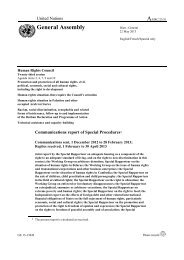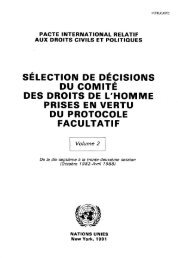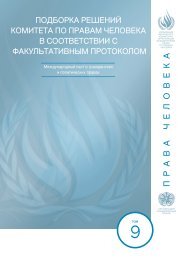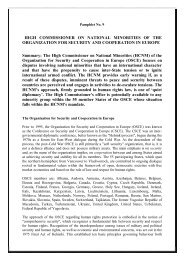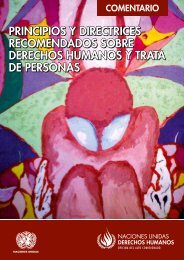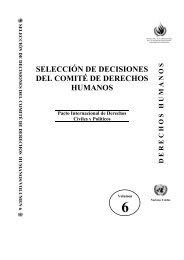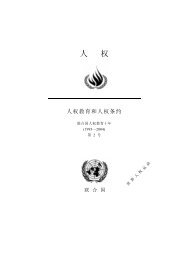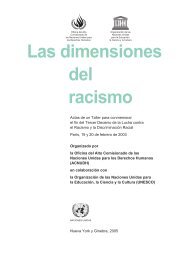good governance practices for the protection of human rights
good governance practices for the protection of human rights
good governance practices for the protection of human rights
Create successful ePaper yourself
Turn your PDF publications into a flip-book with our unique Google optimized e-Paper software.
Importantly, <strong>the</strong> practice <strong>of</strong> social audits raised awareness among civil society,<br />
politicians and <strong>the</strong> public <strong>of</strong> <strong>the</strong> link between corruption, <strong>the</strong> right to know and<br />
<strong>the</strong> right to a livelihood. A national grass-roots movement triggered broad debate<br />
and a nationwide demand <strong>for</strong> <strong>the</strong> public’s right to scrutinize <strong>of</strong>ficial records,<br />
which contributed to <strong>the</strong> adoption <strong>of</strong> right-to-in<strong>for</strong>mation legislation in nine<br />
States and <strong>of</strong> <strong>the</strong> 2005 Right to In<strong>for</strong>mation Act, which applies to all Indian<br />
States. This bill governs <strong>the</strong> public’s access to in<strong>for</strong>mation and prescribes<br />
penalties <strong>for</strong> State <strong>of</strong>ficials failing to provide it.<br />
However, activists recognize that transparency is only one step towards ensuring<br />
that <strong>the</strong> poor can have a meaningful influence on decision-making processes and<br />
development policies. In addition to guaranteeing <strong>the</strong> right to in<strong>for</strong>mation, it is<br />
crucial that people are consulted on how <strong>the</strong>y should be governed. This requires<br />
continued engagement and winning <strong>the</strong> right to participation in policy <strong>for</strong>mulation<br />
as well as implementation.<br />
D. Combating bribery in <strong>the</strong> public health sector – Poland<br />
Issue<br />
Corruption in <strong>the</strong> health-care sector results from a number <strong>of</strong> factors, including<br />
<strong>the</strong> lack <strong>of</strong> clear standards <strong>for</strong> evaluating <strong>the</strong> per<strong>for</strong>mance <strong>of</strong> providers, <strong>the</strong> lack <strong>of</strong><br />
effective oversight and <strong>the</strong> absence <strong>of</strong> monitoring. In Poland, bribery is common<br />
in <strong>the</strong> medical and health-care system. In <strong>the</strong> late 1990s, a number <strong>of</strong> high-pr<strong>of</strong>ile<br />
reports by Poland’s highest auditing body—<strong>the</strong> Supreme Chamber <strong>of</strong> Control—and<br />
<strong>the</strong> World Bank discussed <strong>the</strong> prevalence <strong>of</strong> corruption in <strong>the</strong> health-care sector.<br />
Surveys conducted by <strong>the</strong> Batory Foundation also indicated <strong>the</strong> extent <strong>of</strong> <strong>the</strong> problem.<br />
According to a 2001 survey, medical doctors were perceived to be <strong>the</strong> most<br />
corrupt pr<strong>of</strong>essional group and, in 2003, <strong>the</strong> health sector was perceived to be <strong>the</strong><br />
second most corrupt sector and 61 per cent <strong>of</strong> patients admitted <strong>of</strong>fering bribes to<br />
doctors. The low salaries <strong>of</strong> health pr<strong>of</strong>essionals combined with a lack <strong>of</strong> ethics<br />
training, a non-transparent system <strong>of</strong> financing by <strong>the</strong> National Health Services and<br />
underfunded clinics create a fertile ground <strong>for</strong> bribery.<br />
The prevalence <strong>of</strong> bribery in <strong>the</strong> public health sector results in <strong>practices</strong> that violate<br />
<strong>the</strong> right <strong>of</strong> every person to <strong>the</strong> enjoyment <strong>of</strong> <strong>the</strong> highest attainable standard<br />
<strong>of</strong> physical and mental health. Bribery creates discrimination in <strong>the</strong> access to<br />
medical care in favour <strong>of</strong> those patients able to pay bribes.<br />
Response<br />
The prevalence <strong>of</strong> corruption in <strong>the</strong> public health sector needed to be addressed<br />
through a number <strong>of</strong> methods. In addition to appropriate legislation <strong>for</strong>bidding bribery<br />
in <strong>the</strong> health sector, society’s recognition <strong>of</strong> <strong>the</strong> problem was essential as was<br />
<strong>the</strong> <strong>for</strong>mation <strong>of</strong> alliances among civil activists, <strong>the</strong> media and <strong>the</strong> medical pr<strong>of</strong>ession.<br />
Fur<strong>the</strong>rmore, appropriate <strong>governance</strong> mechanisms were required to inject<br />
accountability and transparency into <strong>the</strong> management <strong>of</strong> health services. In 2001,<br />
<strong>the</strong> establishment <strong>of</strong> <strong>the</strong> Medical Task Force, consisting <strong>of</strong> civil and <strong>human</strong> <strong>rights</strong><br />
68



